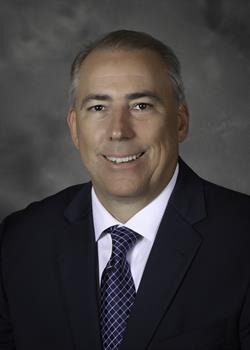
Schoolcraft College President Dr. Glenn Cerny recently was part of a panel of key academic leaders discussing the role of higher education in developing the workforce of the future. The program, “Advancing Skills Education & Training: The Real Talent Pipeline,” was presented by the Canton Chamber of Commerce on Thursday, May 6.
Dr. Cerny was joined on the panel by Brian Calley, President of the Small Business Association of Michigan; Russell A. Kavalhuna, J.D., President of Henry Ford College; and Dr. James M. Smith, President of Eastern Michigan University. Roop Raj of FOX2 moderated the discussion.
The overall focus of the dialogue addressed the talent shortfall in just about every business sector. Each member of the panel made the point that this shortfall was an issue well before the COVID-19 pandemic and has continued. Adding to the woes is that there are fewer high school students to begin with as well as lower graduation rates, which creates a one-two punch further constricting the pipeline.
Dr. Cerny made the point that community colleges need to raise awareness with middle school students.
“What our employers are telling us is we have a lot of students that are not just understanding their options to go into these careers or occupations – they’re not being exposed,” he said. “We’ve been working with our middle schools, because if you don’t get to the kids early and if you don’t give them exposure to manufacturing and healthcare and other careers, they don’t pursue it.”
Additionally, Dr. Cerny wants these students to understand that community colleges and four-year schools can be an “and,” rather than an “or,” proposition.
“They think it’s a mutually exclusive option that they have to choose either a community college or a four-year. That’s not the case at all,” he said. “Community college is a great way to expose a 9th, 10th and 11th grader (to higher education).
Dr. Smith added that the many articulation (transfer) agreements that community colleges have in place with four-year schools make it easy and seamless for students to transfer credits. In addition to the cost savings from starting at a community college, Dr. Cerny added that the practical experience gained creates a more well-rounded and stronger student.
“Once you get hands-on exposure, the theoretical becomes a lot easier,” he said “They can design, as an engineer, things that can be produced in the manufacturing environment.”
The program was shown on Facebook Live. You can view a replay here.